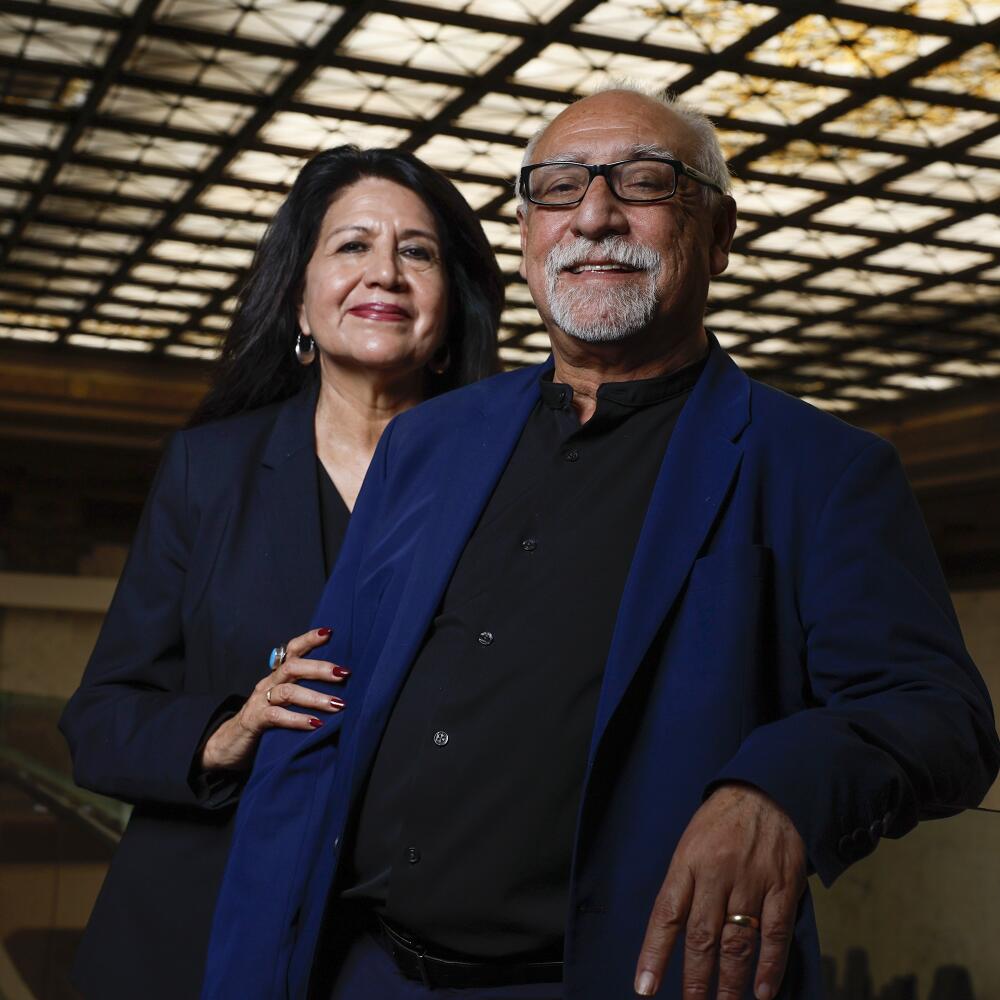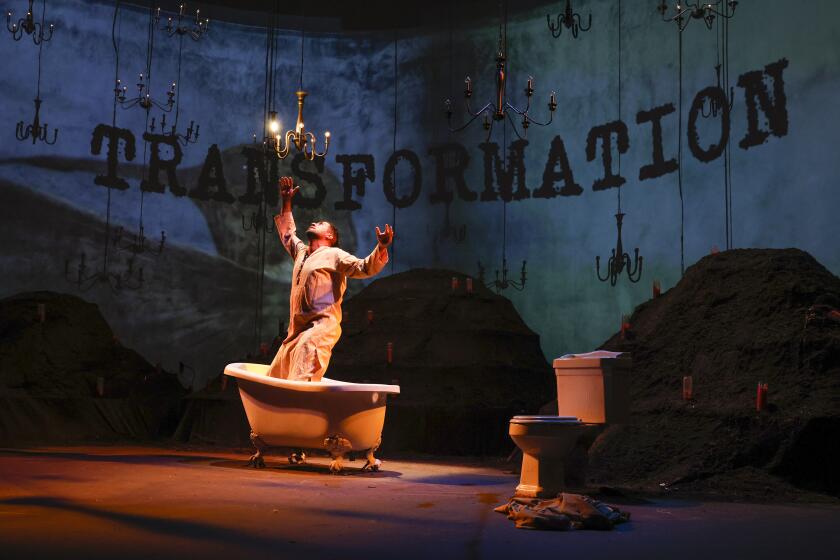
- Share via
As executive producer of Teatro Breve, Naíma Rodríguez plans to take its original plays and programming outside Puerto Rico and into the diaspora in the rest of the United States.
“It’s important to get in touch with the people who left the island for different reasons, and who have that desire and need to connect,” said Rodríguez, who leads the independent theater company in Puerto Rico.
In the latest work by the L.A. native and MacArthur ‘genius’ grant winner, a bleeding man’s arrival tests the faith of an order of Central Valley monks
Doing so would “create an exchange with other Latinos and Hispanic people who can learn about what is happening in Puerto Rico through our works,” she said.
Achieving this goal is now possible for Teatro Breve thanks to a new $75,000 grant it will be receiving annually over two years from the National Latinx Theater Initiative — a new program, spearheaded by the Los Angeles-based Latino Theater Company — that aims to boost the national profile of Latino theater companies across the U.S., including Puerto Rico.
Rodríguez says this money will not only help with rent costs but can cover travel expenses for Teatro Breve’s actors and production crews to bring their work to the rest of the U.S.
Get the Latinx Files newsletter
Stories that capture the multitudes within the American Latinx community.
You may occasionally receive promotional content from the Los Angeles Times.
On Monday, the Latino Theater Company announced $9 million in grants to 52 Latino theaters in cities such as New York, Los Angeles, Chicago, Santa Fe, N.M., Denver, Providence, R.I., and St. Paul, Minn.
Six theater spaces in Puerto Rico are receiving grants.
Rodríguez said they’re proud to be recognized “as one of the most solid independent theater companies in Puerto Rico.” The grant will help sustain their company — founded in 2006 — which offers daily programming, including improv and stand-up comedy. Teatro Breve, she said, is “providing employment and constant work to a team of people who develop theater and who can make a living from it.”
This initiative was made possible after the Latino Theater Company in downtown L.A. received a three-year, $5-million award from the Andrew W. Mellon Foundation to strategize and work with others to create the grant program. To Stephanie Ybarra, a program officer with the Mellon Foundation, it makes sense that the Latino Theater Company, founded nearly 40 years ago, is at the helm of the initiative “given their long history of advocacy and service to not just L.A. but to the national Latino theater scene.”
Other funding comes from national and local foundations: The Rockefeller Brothers Fund is providing $750,000 over three years, the Joyce Foundation is allotting $600,000 over three years, and the California Community Foundation is contributing $500,000 over two years. The Ford Foundation is providing $2 million over two years.
Grants are earmarked for Latino theaters with operational budgets of more than $250,000 that have offered programming for at least 15 years. The grants range from $75,000 to $150,000 a year for a minimum of two years.
Funds also are allotted to Latino theaters with lower budgets that have offered programming for at least five years. The grants are between $25,000 and $60,000 for a minimum of two years.
Olga Garay-English, a director with the National Latinx Theater Initiative, said it aims to procure additional money to reach a three-year fundraising goal of $15 million.
Garay-English, an arts administrator, said the initiative was inspired by the Black Seed, which is recognized as a first-of-its-kind program providing financial support for Black theaters across the country. That effort was spearheaded by the Billie Holiday Theater in Brooklyn with a $5-million grant from the Mellon Foundation.
“As with the Black Seed, this is the first time major donors are systemically addressing the perennial under-funding and under-capitalization of Latinx theater companies,” Garay-English said.
Garay-English said they learned that “many of these theaters are basically functioning with volunteer support.” Through a survey, they found that artistic directors earned an average salary of nearly $13,000 a year, with executive directors making slightly more than $37,000 a year.
“These people are having second or third jobs, and they’re doing this just for the passion, and to serve the community,” Garay-English said.
The initiative will offer professional development and will host annual grantee convenings and consultations with the Nonprofit Finance Fund.
Garay-English said they sought Latino theaters that are made up of and that serve Chicanos, Puerto Ricans, Cubans, Venezuelans and other Latinos in the diaspora. Selected theaters range from Combat Hippies in the Miami area to Cazateatro Bilingual Theater Group in Memphis, Tenn.
“We wanted to very much make a statement that this artistic effort and experience is not just relegated to what people typically think of as Latino-rich communities,” she said.
José Luis Valenzuela, who founded L.A.’s Latino Theater Company in 1985 because of a lack of Latino productions in the city, said they wanted the money to go to theater companies with significant Latino representation on their boards and staff that produce plays and programming for the Latino community.
Valenzuela, who also serves as a director with the National Latinx Theater Initiative, said it’s necessary to invest in Latino theaters because “we are telling our own story from our own point of view.”
The Latino Theater Company has hosted “encuentros,” three-week theater programs featuringcompanies from the U.S., Canada, Mexico, Cuba, Peru and Colombia. The company also provides tickets to its plays and programs to community college students in Los Angeles County. Currently, it’s showcasing “The Travelers,” a meditative drama written by playwright and MacArthur “genius grant” winner Luis Alfaro.
“We are creating a cultural hub, and also we are fitting into the economy of that community,” Valenzuela said.
For the Guadalupe Cultural Arts Center in San Antonio, the $80,000 it will receive over two years will help renovate the theater in its nine-building campus.
Jorge Piña, its theater arts director, said the grant will also enable him to bring on staff to help with audience development, run productions and manage Grupo Animo, a teen resident theater company he created in 1992 that has included plays on the Uvalde, Texas, school shooting and the children detained inside chain-link fences at the U.S.-Mexico border during Donald Trump’s presidency.
“The reflection that you’re going to see onstage is the mirror. You’re not going to find that on TV. You’re not gonna find it on film. Yes, we’re breaking through. Yes, we have films here and there. Yes, we have more brown faces on TV, but it’s not enough,” Piña said.
“What you have in theater, it’s the real deal. You’re going to hear our stories.”
More to Read
The Latinx experience chronicled
Get the Latinx Files newsletter for stories that capture the multitudes within our communities.
You may occasionally receive promotional content from the Los Angeles Times.









